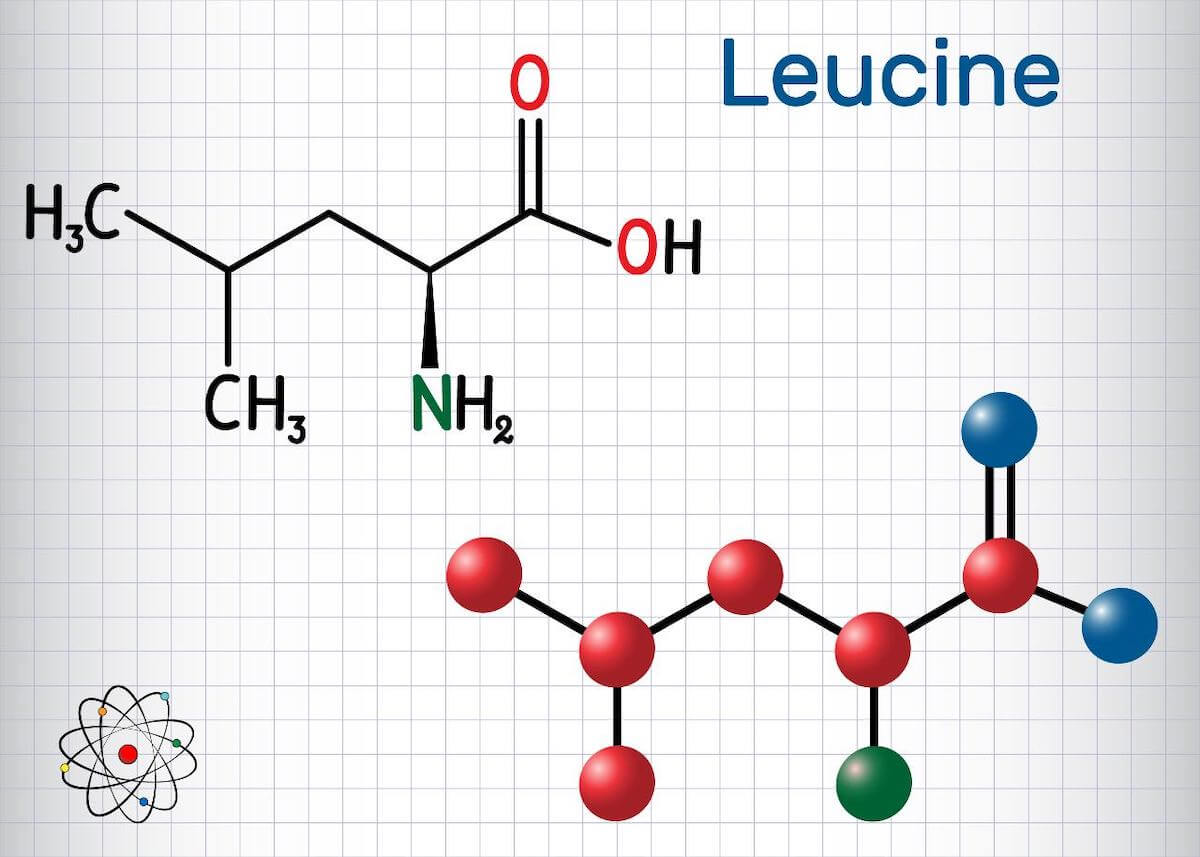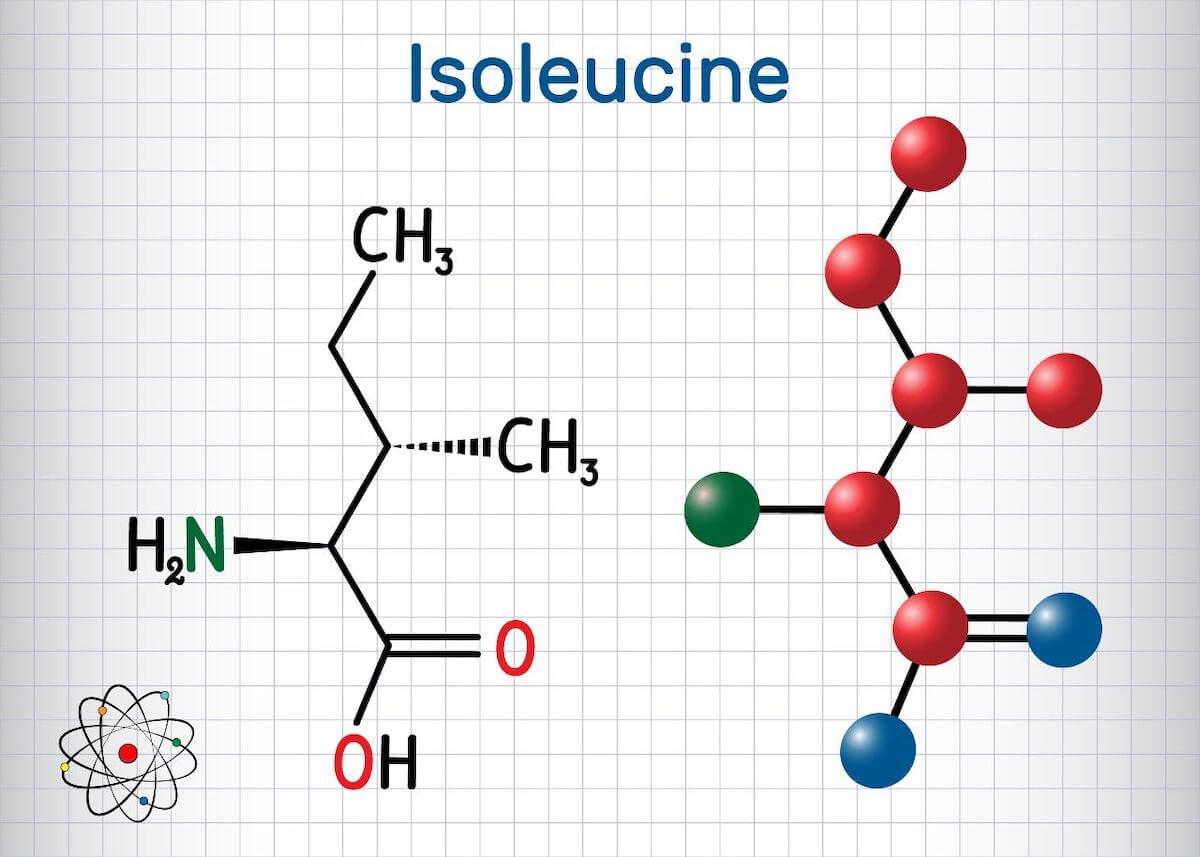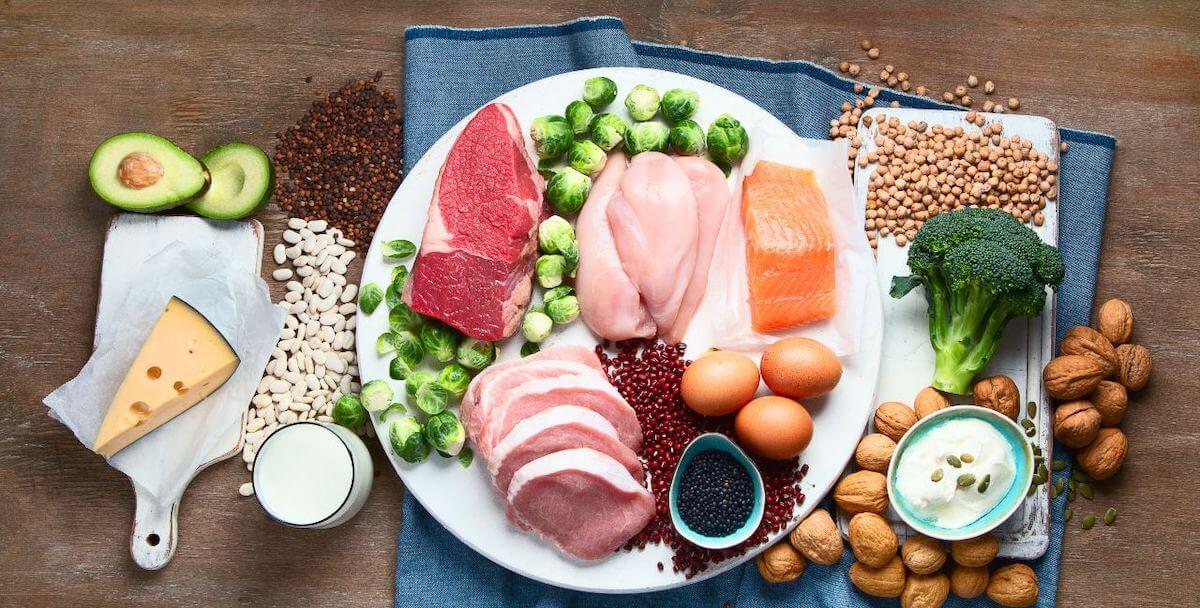
03 Sep Leucine vs. Isoleucine: Understanding These Amino Acids
Leucine and isoleucine are amino acids that are critical to our survival. They may sound similar, but each has their own specific functions in the human body. So what’s the difference between leucine vs. isoleucine? And do you have to choose?
Let’s explore these crucial compounds, their similarities and differences, how they work in the body, and where you can get them.
What Are Amino Acids?
Before we look specifically at leucine vs. isoleucine, it’s important to understand the overall role of amino acids, particularly branched-chain amino acids (BCAAs).
Amino acids are the basic building blocks of all your body tissues, including your cells, organs, muscles, eyes, skin, hair, and nails. They also provide energy to fuel your body, produce hormones and neurotransmitters, and facilitate many chemical reactions that contribute to the healthy functioning of your body. In a nutshell, amino acids are essential to the human body and you cannot function without them.
The Essential Amino Acids
Our body can make 11 of the 20 amino acids, but there are nine — known as the essential amino acids — that we can only get from the food we eat, especially protein.
The essential amino acids are:
- Leucine
- Isoleucine
- Valine
- Tryptophan
- Lysine
- Methionine
- Histidine
- Phenylalanine
- Threonine
How Does Your Body Get Essential Amino Acids From Protein?
Proteins are essentially chains of amino acids strung together in different arrangements. As part of the digestive process, enzymes called proteases break down the peptide bonds in the protein you consume, liberating the amino acids. Those amino acids are then recombined through a process called protein synthesis into new proteins that your body can use.
What Are Branched-Chain Amino Acids (BCAAs)?
The first three amino acids on the list above — leucine, isoleucine, and valine — are known as branched-chain amino acids, or BCAAs for short. BCAAs are so called because of their molecular structure, which has the usual basic amino acid structure, plus a branched side chain.
Branched-chain amino acids are important for general health but they’re especially critical for building and maintaining muscle and helping with muscle recovery after physical trauma (which also includes any kind of intensive exercise). They’ve also been shown to help with boosting performance, and reducing and delaying fatigue during and after exercise.
In addition, BCAAs are closely involved in fatty acid metabolism, breaking down the essential fatty acids we get from our diet to produce energy.
What Are Leucine and Isoleucine?
Leucine and isoleucine, the two BCAAs we’re concerned with here, are both non-polar (uncharged) aliphatic amino acids. They are structural isomers, meaning they have the same molecular formula but each has a slightly different structure. The small differences between them result in different physiological properties and they also interact differently with other amino acids.
Why You Need Leucine (or L-Leucine)

In the life sciences, Leucine is often denoted as “Leu” or simply “L”.
Leucine is the amino acid most critical for building and maintaining skeletal muscle as it’s responsible for triggering protein synthesis. It also helps to reduce muscle protein breakdown, which is especially important for athletes and bodybuilders. When you exercise, you use up energy that needs to be replaced. Unless you consume enough extra protein, especially leucine, your body starts to break down muscle to access the glycogen stored there.
Not surprisingly, leucine becomes increasingly important as you age. As you get older, you naturally lose muscle mass. But this can be counteracted with a combination of resistance exercise and amino acid supplementation.
Leucine helps regulate blood glucose and is important in wound healing. There is also evidence to suggest that leucine may support weight management, both because it stabilizes blood sugar and ensures that muscle mass isn’t lost as you reduce calories — this is important as muscle mass helps your body burn excess fat.
Why You Need Isoleucine (or L-Isoleucine)

Isoleucine is usually denoted as “Ile” or just “I.”
Like leucine, isoleucine helps with healing wounds and regulating blood sugar, and it’s involved in building muscle, although not as much as leucine. It also has a host of other functions.
Isoleucine is especially important during exercise as it stimulates glucose uptake into cells and then helps break down that glucose into energy, enhancing performance. It acts as a hypoglycemic agent to lower blood glucose levels, which is useful for diabetics.
Isoleucine helps to detoxify nitrogenous waste, like ammonia, which the kidneys then excrete from the body. It’s also heavily involved in the production of red blood cells and hemoglobin, which carries oxygen from the lungs to other areas of the body where it’s needed. Isoleucine is therefore critical when you’re recovering from blood loss or anemia. As a bonus, isoleucine helps to maintain a healthy immune system.
How Much Leucine vs. Isoleucine Do You Need?
The amount of protein we need is fairly well established, but when it comes to breaking that down into individual amino acids, the results are a bit less conclusive.
- Leucine: The original recommendations for the average sedentary person have been revised upwards to at least 40 milligrams per day per kilogram of weight — more if you’re involved in intensive athletic training.
- Isoleucine: If you’re only moderately active, 19 milligrams per kilogram of weight per day is considered enough. But again, if you’re extremely active, you may need more.
- As a general rule, the recommended ratio of leucine: isoleucine: valine is 2:1:1.
Where to Get Leucine and Isoleucine

Because leucine is found in so many everyday foods, deficiency is very rare. Isoleucine deficiency is more common, especially as you age, so make sure you’re getting enough.
Protein is an excellent source of all the essential amino acids, but these whole foods are particularly good sources of both leucine and isoleucine:
- Beef
- Chicken
- Fish, especially salmon
- Dairy, like cottage cheese
- Eggs
- Legumes, like soybeans, lentils, chickpeas, and beans
- Brown rice
- Nuts, like almonds, cashews, and Brazils
- Seeds, like sesame, sunflower, and pumpkin
BCAA Supplements
Even if your diet includes all the essential macronutrients — protein, carbohydrates, and fats — you may not be able to get enough BCAAs from whole foods if you’re training intensively. In that case, supplements can give you the boost you need.
Whey protein powder and soy protein powder are some of the highest-quality sources of leucine and isoleucine. Or you could look out for a supplement that contains only BCAAs. Although BCAA supplements have been around for decades, there is finally one that delivers enhanced absorption — Ingredient Optimized ioBCAA. Built on the same platform as ioWhey Protein and ioPea Protein, ioBCAA will be launching in stores and online soon.
If you choose to use supplements, it’s worth investing in a high-quality, independently tested brand that can prove its efficacy and bioavailability.
A Word of Caution
Note that BCAAs are not for everyone:
- Some people are unable to break down BCAAs due to a condition known as Maple Syrup Urine Disease (MSUD), which causes urine to smell sweet. Although this is a rare disease and usually diagnosed in infancy, even if you suffer mildly from it, the effects can be serious if it’s left untreated as amino acid buildup can lead to possible brain damage. Luckily, once it’s diagnosed, it can be managed through dietary intervention.
- There isn’t much research available about the safety of BCAAs during pregnancy or while breastfeeding. The little that is available is not encouraging, so it’s best for women to avoid supplementation when pregnant and nursing.
If you have any other medical conditions, consult with a medical professional before taking BCAA supplements.
Leucine vs. Isoleucine: Which to Choose?
Leucine and isoleucine are branched-chain amino acids. While both are involved in protein synthesis, leucine particularly excels in this area. Isoleucine, on the other hand, is better at providing energy and taking care of the immune system, as well as managing blood glucose, detoxifying nitrogenous waste, and producing red blood cells and hemoglobin.
Although you may choose to emphasize one over the other for your particular purposes, they work extremely well together. Whether you get them exclusively from whole foods or boost your intake with supplements, they’re an essential part of your daily nutritional requirements for health and peak performance.


